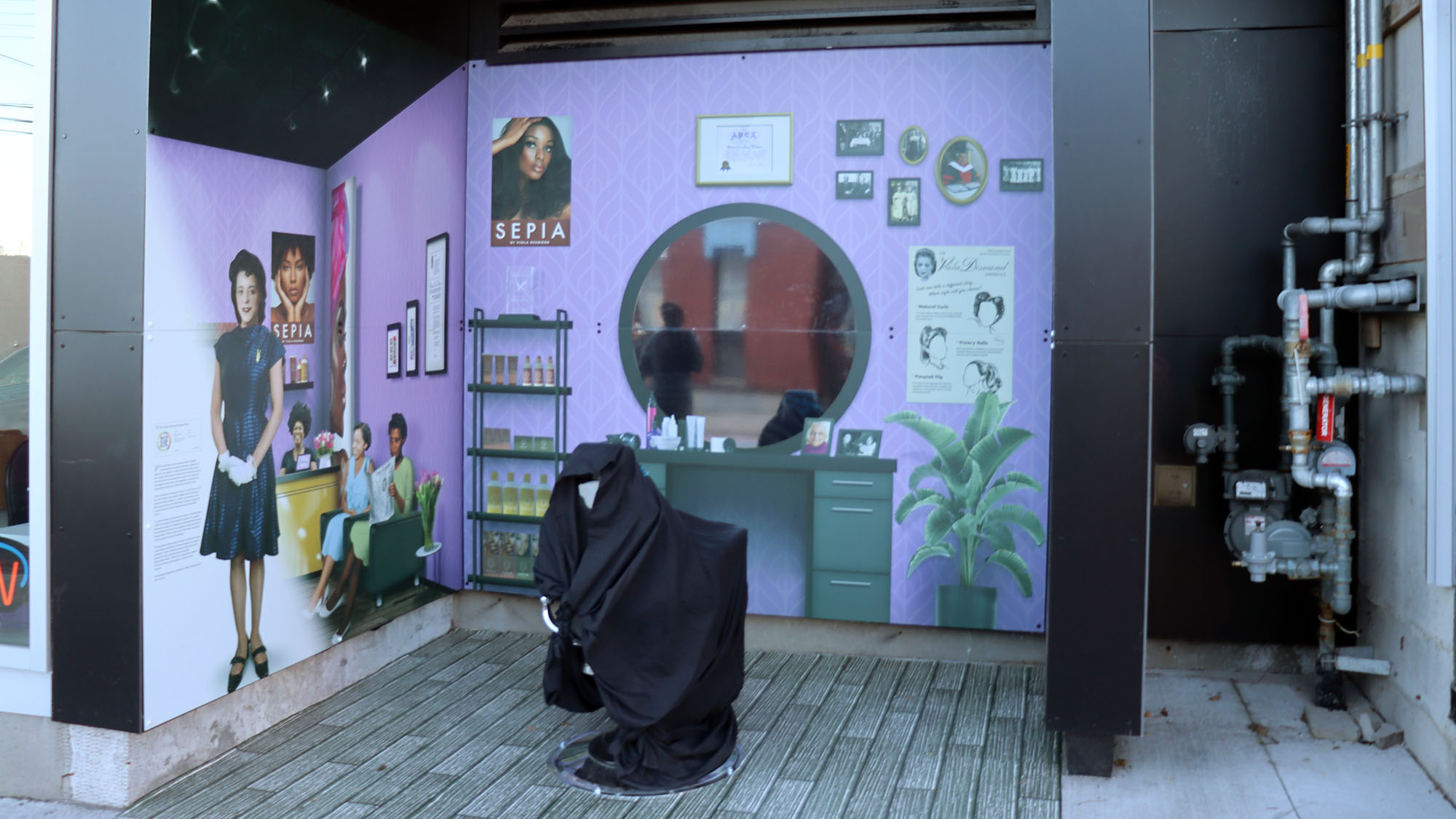Ceremony unveils art installation commemorating Viola Desmond
North End Halifax committee shows appreciation for civil rights activist

caption
This art installation on Gottingen Street in Halifax honours human rights icon Viola Desmond.An art installation honouring civil rights pioneer Viola Desmond was unveiled in Halifax’s north end on Wednesday.
A crowd of more than 50 people gathered on a Gottingen Street sidewalk to see a new interactive piece of art that places a salon chair on the sidewalk across the street from the North End Library.
The Viola Desmond Legacy Committee hosted the unveiling of the art project they have been working on for about two years.
The interactive art is both a physical and digital experience.
The focus of the physical portion is a rotating chair from a hair salon. The idea was to create a modern version of the chairs Desmond would have used in her shop. Behind the chair are three sides of a mural which display awards she won, the hairstyles she created, and the hair and skin products she made and sold.
For the digital aspect, there’s a QR code on a panel next to a brief description of Desmond. Scanning the QR brings up a link to GLYPIX.com, which has more information about Desmond and her story. Eventually you will be able to see an actress who plays Desmond do your hair on a mirror across from the salon chair.
Creator Marven Nelligan wanted to make something that was fun and modern, so that Desmond’s legacy can be preserved for future generations.
“I always like to think outside the box with any artwork that I do, or anything that I create. I always try to think about … what is the best thing that I could possibly make? And then how can I make it better,” Nelligan said.
Nelligan, from North Preston and raised in nearby Uniacke Square, was selected from 16 applicants to create the commemorative artwork. He’s done many works across HRM including the Creighton Street Painting Project, the Concrete Legacy installation on Halifax Common and the Preston Township three-part mural entitled Our Home.
For over 15 years, Nelligan worked in the technology industry as a designer and programmer, which inspired him to make the art an interactive piece using artificial reality.
Nelligan said the program will release new information and features about Desmond over time. He thanked everyone who contributed to the project.
“We were very fortunate to collaborate with many of the talented individuals and professionals from the North End, like Megan Ryan, who portrayed our Viola for the experience … our entire team was mostly people from companies from the North End.”

caption
Marven Nelligan, left, is the lead artist of the project and described the art for the crowd on Wednesday. Tracy Jackson, centre, is the executive director of the North End Business Association.Significance
Viola Desmond was a salon owner in 1946. In November of that year she went to a segregated movie theatre in New Glasgow. She was arrested for taking a seat on the main floor of the theatre, which at the time was reserved for white citizens, while Black citizens had to sit in the balcony.
She spoke out against this injustice and took the case to the Nova Scotia Supreme Court. She lost the case, but became an inspiration in the fight for civil rights in Canada.
Tara Taylor is an entrepreneur and a member of the committee and said she was honoured to have the mural right next to her business, The Braiding Lounge Salon.
“So I just feel like I’m not Viola, never will be, but I want to just embody what she meant to the business world … the black woman business world,” Taylor said.
The art instalment is at 2300 Gottingen St., which is in the neighbourhood where Viola Desmond’s salon was open back in the 1940s.
The significance of the art is to remind residents of Desmond’s impact on the community and to educate the public on her important legacy in the fight for civil rights in Nova Scotia and the rest of Canada.
“I would say she’s so important because we’re still uncovering why she was important. We’re still learning more and more beyond that theatre story,” said Taylor.
About the author

Decklan Z. Rolle
Decklan Z. Rolle is a reporter for the Signal. He is currently majoring in journalism and gaining a minor in contemporary studies at the University...
